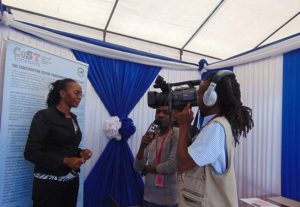 In Tanzania, issues surrounding corruption dominate the national agenda: this relates especially to the realm of infrastructure as it is an area which is particularly prone to financial mismanagement and corruption risks. According to Transparency International’s Corruption Perceptions Index 2018, Tanzania scored 36/100 and is ranked 99th out of 180 countries globally: Tanzania’s score has been steadily improving since 2015. The World Bank’s Worldwide Governance Indicators 2017 gave Tanzania a percentile rank of 39.4% for the control of corruption.
In Tanzania, issues surrounding corruption dominate the national agenda: this relates especially to the realm of infrastructure as it is an area which is particularly prone to financial mismanagement and corruption risks. According to Transparency International’s Corruption Perceptions Index 2018, Tanzania scored 36/100 and is ranked 99th out of 180 countries globally: Tanzania’s score has been steadily improving since 2015. The World Bank’s Worldwide Governance Indicators 2017 gave Tanzania a percentile rank of 39.4% for the control of corruption.
CoST Tanzania: How it all began
Tanzania was one of the eight countries to participate in the CoST pilot study between 2008 – 2010. This looked specifically at how a multi-stakeholder approach could increase transparency and accountability in delivering infrastructure projects. Across the eight participating countries, it assessed a total of 100 projects of varying size, which provide essential public services such as roads, housing, water, flood protection, education and health. After CoST Tanzania launched in November 2008, a Multi Stakeholder Group (MSG) was created which comprised members from government, the private sector and civil society organisations. Supported by a national coordinator, the MSG carried out three key activities:
- The development of a baseline study to profile the local construction sector, the laws and regulations relating to public administration and transparency, and relevant institutions and initiatives relating to governance. The study also comprised analysis of key project information from a sample of recently completed infrastructure projects.
- Testing the disclosure process in a few procuring entities, assembling a list of key project information from a sample of current ongoing projects and publicly disclosing the data.
- Conducting an assurance review of the disclosed project information, identifying causes for concern and helping stakeholders to understand the main issues.
The CoST Tanzania MSG appointed four assurance teams to collate and analyse project information from six projects across the road, health, water and education sectors. The teams identified a number of issues, including inadequate designs prepared prior to tender and a lack of competition for both the supervision and works contracts.
The four features of CoST
The core features of CoST: disclosure, assurance, multi-stakeholder working and social accountability, provide a global standard for CoST implementation in enhancing infrastructure transparency and accountability.
Assurance in Tanzania

CoST promotes accountability through its assurance process – an independent review of the disclosed data by assurance teams based within CoST programmes.
CoST Tanzania conducted its first assurance process in 2013, which looked at the construction of health facilities in the regions of Mara, Mtwara and Tabora, and road projects in the Morogoro region and the Tanga region.
In 2017 CoST Tanzania began its second assurance process on two major projects and one water programme in Tanzania. The projects included were the TAZARA Intersection Project and the NSSF Dungu Housing Project. The water programme focused on analysing the Water Sector Report 2016, a government report which assessed all of the water projects managed by the Ministry of Water and implemented between 2006 – 2016. The assurance report found there had been positive achievements in the water sector and that health and safety standards had been adhered to in the TAZARA intersection project. However, the TAZARA project also highlighted significant issues in the procurement process in Tanzania: all procurement for the project was done in Japan and restricted to Japanese companies. The estimated final cost of the project also increased by more than 60%.
Three projects along the Mpanda-Koga-Tabora road have been assessed as part of CoST Tanzania’s most recent assurance process and an assurance report is expected to be launched in November 2020.
Disclosure in Tanzania
The disclosure process ensures that data about the purpose, scope, costs and execution of infrastructure projects is open and accessible to the public, and that it is disclosed in a timely manner.
CoST Tanzania encourages procuring entities to disclose information to the Public Procurement Regulatory Authority (PPRA) on a project by project basis.
At present, the PPRA’s Regulation No. 10(3) of 2013 requires that all procuring entities submit project information to the PPRA in a predetermined, set format. The design of this template is currently being discussed by PPRA and CoST Tanzania to ensure that information required by the CoST Infrastructure Data Standard (CoST IDS) is incorporated into it. This would then see procuring entities disclose the 40 data points or ‘items’ which make up the CoST IDS, including preparation, procurement and implementation stages.
The CoST IDS has been incorporated into the District Roads Management System, which is operated by the Tanzania Rural and Urban Road Agency (TARURA) – one of the key procuring entities involved in large-scale road projects. Thus, this is a good indicator of the Government of Tanzania’s support for CoST and high-level acceptance of the CoST IDS.
There are 15 road projects planned for the future which will be assessed according to the CoST methodology. Construction of these projects will be funded by the UK Department for International Development.
Multi-stakeholder working in Tanzania
CoST brings together stakeholder groups with different perspectives and backgrounds from across government, private sector and civil society. Through each programme’s Multi-Stakeholder Group, these entities can guide the delivery of CoST and pursue infrastructure transparency and accountability within a neutral forum.
CoST Tanzania is hosted by the National Construction Council and its MSG is made up of representatives from the government, the private sector and civil society. CoST Tanzania’s CoST Champion is the Minister for the President’s Office, Public Service Management and Good Governance.
Social accountability
The social accountability feature of CoST ensures that information on public infrastructure projects is put in the public domain. CoST works with stakeholders such as the media and civil society to promote the findings of the assurance process and ensure decision makers are held to account.
In March 2019, CoST Tanzania piloted a monitoring and evaluation exercise with local civil society organisations (CSOs) in two districts of Kilosa and Gairo in Morogoro. In this exercise, the CSOs engaged with the communities alongside constructed roads in the districts in order to gain their view of any issues with the projects.
The exercise highlighted a lack community involvement throughout the entirety of the planning process. There was a lack of knowledge at the community level about CoST Tanzania and the Tanzania Rural and Urban Road Agency, which is the procuring entity. Uncompensated funds mean there is a possibility of future conflict between the community and procuring entity. This highlights a need for greater engagement with CSOs, procuring entities and local communities: facilitating communication between all groups will limit the likelihood of such conflict arising.
More projects will be involved in similar monitoring and evaluation exercises in the future.
CoST visibility in Tanzania has been growing. In June 2019, CoST Tanzania presented a paper on “The Essence of Transparency and Accountability in Construction Projects” during the 3rd Africa Ports Expansion, Roads, Bridges and Highways Africa Conference which held in Tanzania . In addition, various training sessions have been held for procuring entities to promote transparency in public funded infrastructure projects.
CoST Tanzania will soon embark on a far-reaching engagement programme with universities, procuring entities and CSOs in the infrastructure and transparency sectors. Work will also begin on a CoST Tanzania disclosure portal.
CoST Tanzania assurance reports
Project data for CoST Tanzania assurance process 2013: Ministry of Health
Project data for CoST Tanzania assurance process 2013: Ministry of Health
Project data for CoST Tanzania assurance process 2013: Magol to Turiani
Project data for CoST Tanzania assurance process 2013: Chalinze to Kitumbi
Summary of CoST Tanzania assurance process 2017
CoST Tanzania 2017 Assurance Report: TAZARA Intersection Project
CoST Tanzania 2017 Assurance Report: Dungu Satellite Village Project
Get in touch
CoST Tanzania Programme Manager
Tumaini Lawrence
tanzania@infrastructuretransparency.org
Follow CoST Tanzania on Twitter and Facebook